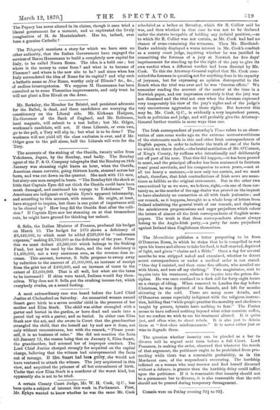A certain County Court Judge, Mr. W. H. Cook, Q.C.,
has been quite a subject of interest this week in Parliament. First, Mr. Eykyn wanted to know whether he was the same Mr. Cook scheduled as a briber at Beverley, which Sir R. Collier said he was, and then whether in that case he was not to be declared under the statute incapable of holding any judicial position,—as to which Sir R. Collier was not certain, as Mr. Cook bad had no chance of cross-examining the witnesses. Then Mr. Haviland- Burke suddenly displayed a warm interest in Mr. Cook's conduct as a county court judge, inquiring whether he was justified in committing the foreman of a jury at Norwich for five days' imprisonment for standing up for the right of the jury to give its own verdict when a different verdict had been directed by Mr. Cook. To this the Attorney-General replied that Mr. Cook com- mitted the foreman in questiog not for anything done in his capacity of juryman, but for expressing an opinion disrespectful to the Bench when the trial was over and he was functus officio.' We remember reading the account of the matter at the time in a Norwich paper, and our impression certainly is that the jury was not dismissed and the trial not over when the foreman expressed very temperately his view of the jury's rights and of the judge's very uncourteous aggression on those rights. But however this may be, Mr. Cook, Q.C., is evidently a very imprudent person, both as politician and judge, and will probably give the Attorney- General further trouble in more ways than one.


































 Previous page
Previous page